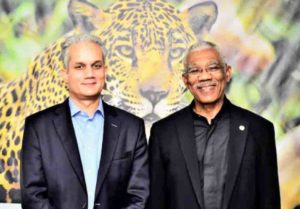
Former Presidential Advisor on Petroleum to Guyana, Dr Jan Mangal says a lot of what the coalition Government does now and how it plans for the future, particularly as it relates to the oil and gas industry, will determine whether or not it can be re-elected to office.
However, Dr Mangal believes that the Government’s chances are low based on a number of factors. His comments come in light of the recently-concluded Local Government Elections (LGE) which saw the coalition performing poorly as compared to the main Opposition party.
“The margin in the 2015 election was in the range of noise. It is unlikely an incumbent Government, somewhat bruised after five years in power, will benefit the same way it did when it was new, untested, and full of promise,” he said in a social media post.
He pointed to some areas where the incumbent Administration could improve, stating that it must assume that the chances of being re-elected were slim. Dr Mangal said the Administration’s manifesto promises of making Government accountable would form part of the decision.
The David Granger-led Administration has failed to fulfil key promises, chief of which is ensuring constitutional reform. Also, while the coalition has made a commitment to creating jobs, it has instead fired thousands of sugar workers countrywide.
“Assume first oil by 2020 will not be a big factor with the voters in the 2020 election … Assume the voters would like to see the Government negotiating a fair deal with Exxon which maximises the benefit to the people of Guyana over the long term,” he advised.
Again, the Government has been staunchly criticised for the deal it inked with the US oil giant. Opposition Leader Bharrat Jagdeo had flayed the Government for the less-than-favourable terms it negotiated on Guyana’s behalf in the oil contract.
Jagdeo made it clear that despite Guyana holding all the cards when it sat down at the negotiations table, the end product was a contract heavily favouring Exxon.
He did not attack the oil company, as he noted it was Government’s duty to properly negotiate with the company, which no doubt had its eyes on profit maximisation and cost reduction.
The deal was also not well received by civil society groups and other citizens.
Meanwhile, Dr Mangal said the Government must also bear in mind that voters would be looking to see if it set up an oil industry that was free of future mismanagement and corruption. However, this remains a widespread concern, especially since the Administration was focused on making the Finance Minister a key manager of how the funds were spent and saved.
Jagdeo has long criticised the Petroleum Commission Bill, saying it was both “oily” and “slick”. He is against full ministerial control of the Natural Resources Fund also. Although the Government has catered for a representative from the Opposition to sit on the committee governing the Fund, Jagdeo has objected to this proposal, stating that politicians should not be included.
National development
The former Presidential Advisor on Petroleum said Government must also assume the voters would like to see some national development prior to 2020 in the form of infrastructure, education, and health care, etcetera, which would require borrowing.
He is suggesting that robust long-term strategic and tactical plans for developing Guyana using oil revenue should be implemented. Dr Mangal said he would like to see these plans include a significant pay raise for all sectors’ employees; making the University of Guyana the preeminent university in the Caribbean; and extensive infrastructural and agricultural development.
Also, he said focus should be placed on making Guyana (and Iwokrama) the leading centre for research into rainforest and green issues; making Guyana a test case and leading research centre for dealing with rising sea level; and finally, making Guyana a cultural and commercial link between the Anglo-Caribbean countries and Latin South American countries.
While some economists, accountants and analysts have mixed views on how the oil revenue should be spent, most of them have concluded that Guyana’s rising debt was something to also consider. Guyana’s total public debt has been increasing over the last three years – going from G$317.7 billion in 2015 to G$344.9 billion in 2017, according to the Public Debt Annual Report of 2017.



